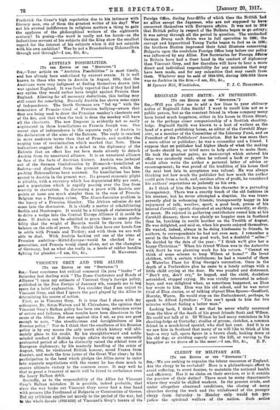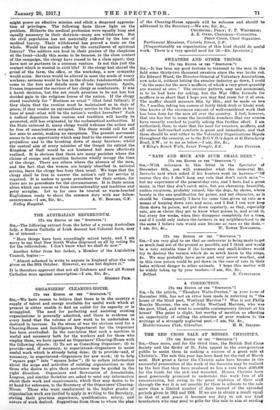CLERGY OF MILITARY AGE.
[To me EDITOR or TEA " SPECTATOR."]
Sue,—We are seeking to organize the labour resources of England. Are the clergy to be excluded? Here is a philanthropic effort to avoid suffering, to avert famine, to maintain' the national health and efficiency. Has it no claim on their services, or is it outside the purview of their duties? There must be many departmenfs where they would be skilled workers. In the present crisis, and under altogether abnormal conditions, the closing of many churches during the week and the withdrawal of the younger clergy from Saturday to Monday only would not pre- judice the spiritual welfare of the nation. Such action
might prove an effective mission and elicit a deepened apprecia- tion of privileges. The following facts throw light on the problem. Hitherto the medical profession were equally busy and equally necessary in their districts—many are withdrawn. But the civil population has not materially suffered .by the loss of medical luxury. Their withdrawal has proved a tonic on the whole. Would the nation suffer by the curtailment of spiritual luxury? The soldiers are loud in their praises of the chaplains at the front—chiefly this seems to be because, in the close contact of the campaign, the clergy have ceased to be a class apart; they have met as partners in a common venture. Is not this just the contact which is wanted in civil life? If the clergy had shared the grind of the farm, the office, or the workshop, a new sympathy would arise. Services would be altered to meet the needs of weary workers; sermons would be less in the clouds; fundamentals would come to the fore and details seem of less importance. Again, France impressed the services of her clergy as combatants. It was a harsh decision, but the net result promises to be not loss but decided gain to the religious forces of the nation. If the clergy stand resolutely for " Business as usual " (that fatal fallacy); if they claim that the routine must be maintained as in days of peace; if they render no extraordinary service to the State in her time of need—what will be the nation's verdict hereafter? Such a radical departure from custom and tradition will hardly be promoted, still less originated, by the ecclesiastical authorities. If the State enforced it, many clergy would u elcome the action and be free of conscientious scruples. The State would call for all her sons to assist, making no exceptions. The present movement seems to be an opportunity which may lead to the removal of many prejudices and to the breaking down of many barriers; whilst the central aim of every minister of the Gospel (to extend the Kingdom of God) would be not hindered but more effectively realized. It is obvious that there are many parishes where the claims of camps and munition factories wholly occupy the time of the clergy. There are others where the absence of the men, and the fact that the women are largely absorbed in national service, leave the clergy less busy than usual. We hope that the clergy shall be free to answer the nation's call for service if required. It is useless to quote precedents for their action, for there are no precedents for the circumstances. It is State action alone which can rescue us from Conventionality and tradition and petty scruples. Let us for once be treated as warm-hearted Englishmen ready to share the common duty with our fellow-



































 Previous page
Previous page